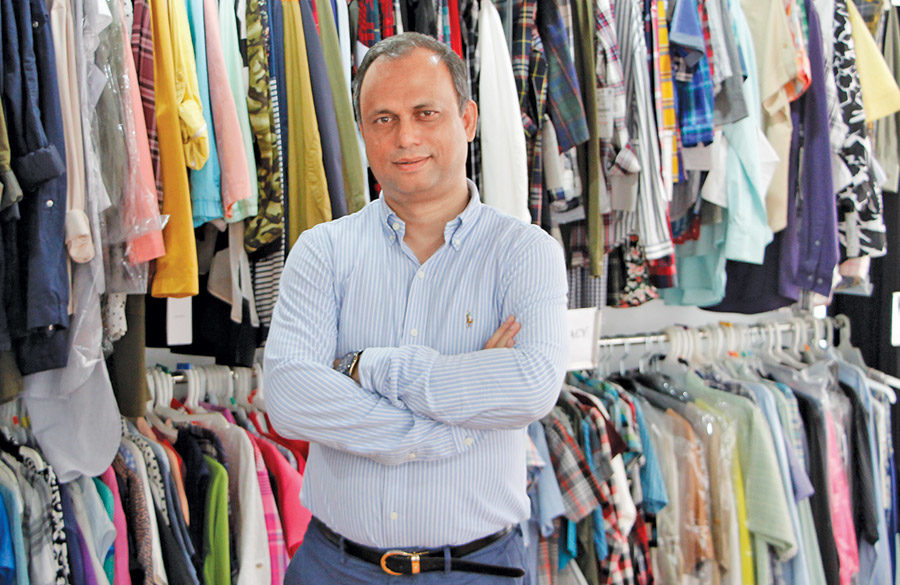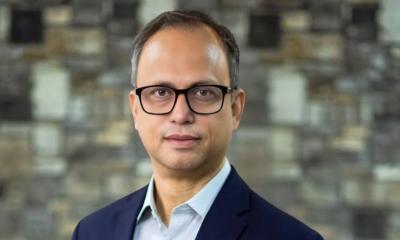Mahmud Hasan Khan Babu has elected the Forum panel in the Bangladesh Garments Manufacturers and Exporters Association (BGMEA) today.
The Forum, led by Rising Group managing director Mahmud Hasan Khan Babu, on Saturday won the Bangladesh Garment Manufacturers and Exporters Association biennial elections for 2025-27, bagging 31 out of 35 directorship posts.
A total of 76 candidates from three panels, one each of the Forum, the Sammilito Parishad and the Oikya Parishad, took part in the elections on Saturday in Dhaka and Chattogram.x
Election officials said that a total of 1,631 BGMEA members, out of 1,864, exercised their voting rights in the elections.
Of them, 1,377 voted in Dhaka and 254 in Chattogram.
The Sammilito Parishad, a contesting panel led by Chaity Group managing director Md Abul Kalam, won only four directorship posts.
The Oikya Parishad failed to bag any posts.
The chairman of the election board Md Iqbal announced the result late Saturday.
Mahmud Hasan Khan Babu bagged highest 1,149 votes in the elections, while Sammilito Parishad panel leader Md Abul Kalam bagged 666 votes and failed to win.
Mahmud Hasan Khan Babu is going to be the next president of the BGMEA.
In Chattogram region, Salim Rahman bagged the highest 1,058 votes.
The elected 35 directors are Mahmud Hasan Khan Babu, Shah Rayeed Chowdhury, Mijanur Rahman, Faisal Samad, Mohammad Abdur Rahim, Inamul Haque Khan, Hasib Uddin, Vidiya Amrit Khan, Md Rezwan Selim, Shahed Udduza Chowdhury, Nafis Uddoula, Mohammad Abdus Salam, Sumaiya Islam, Anwar Hossain Chowdhury, Fahima Akter, Sheikh Hossain Muhammad Mustafiz, Majumdar Arifur Rahman, Kazi Mizanur Rahman, ABM Shamsuddin, Joardar Mohammad Hosne Quamar Alam, Asef Kamal Pasha, Rashid Ahmed Hossaini, Faruque Hassan, Rumana Rashid, Mohammad Sohel, and Samiha Azim from Dhaka region.
Those who won from Chittagong region are Salim Rahman, M Mohiuddin Chowdhury, Syed Mohammad Tanvir, Sakeef Ahmed Salam, Md Shaif Ullah, Mohammad Rafique Chowdhury, Enamul Aziz Chowdhury, SM Abu Tayyab, and Rakibul Alam Chowdhury.
At the Dhaka centre, 1,377 out of 1,561 votes were cast, around 88.21 per cent of the zone’s total votes, while in Chittagong 254 out of 303 votes were cast, around 83.83 per cent of the zone’s total votes.
In both regions, 1,631 votes out of 1,864 votes were cast.
The polling began at 8:00am on Saturday and continued until 5:00pm without any break at the Radisson Blu Water Garden in Dhaka and Radisson Blu Hotel in Chattogram.
According to the BGMEA election schedule, the official final result will be published on June 4. The Election of the office bearers will be held on June 14 and the result will be published on June 16.
The new Board of Directors would take charge on June 16.
Mahmud Hasan brings significant experience to the role, having previously served as vice president and director of BGMEA, as well as also served as director positions in the Bangladesh Textile Mills Association (BTMA) and the Bangladesh Knitwear Manufacturers and Exporters Association (BKMEA).
The last BGMEA election was held on March 9 last year when the Sammilito Parishad panel won in all the 35 director posts with SM Mannan Kochi emerging as its president.
Kochi, however, resigned after the fall of the Hasina-led government in August last year in the student-led mass uprising and the then BGMEA senior vice-president Khandoker Rafiqul Islam Designtex Knitwear Ltd was made the president.
The interim government later appointed M Anwar Hossain, vice-chairman of the Export Processing Bureau (EPB), as the BGMEA administrator.
Little about new President,
Fresh out of Dhaka University and armed with a degree in Sociology, Mahmud Hasan Khan (Babu), MD of Rising Group made his entrepreneurial debut with a humble carton manufacturing unit (Popular Packages & Accessories Ltd., established in 1994), which he retains till date.
Rising Group is a classic example of vision marrying decision making, all taken at the correct junctures of the company’s life span, which turned the Group into what it is today – an entity with over 7,550 employees and US $ 125 million in turnover from its various businesses, from yarns to readymade garments. It is Babu’s vision, his business acumen and rare decision-making ability that turned out to be the game changer. “I used to supply cartons to my friends who were in the business of garment manufacturing. Dealing with them, I learned a lot about garmenting and also got interested in RMG,” maintains Babu, who opened his first manufacturing unit (Rising Fashions Ltd.) in 1997 from a small rented building in Mirpur, Dhaka, with just 120 sewing machines. The fact that Babu’s entry into garment manufacturing coincided with the ‘quota era’ played in his favour.
But as an astute businessman, it did not take Babu long to comprehend that despite the quota facility, dwelling only on regular product categories and that too as a new entrant with multiple established players already in the fray, competition was something that he could ill afford to ignore.
The quota phase out in 2004, operating from a rented facility and lack of domestic availability of yarns and fabrics – which only added to the spiralling production cost for the company – resulted in birth of Rising Spinning Mills Ltd. in the same year at Saturia, Manikgonj, spread over a floor area of 1,64,472 sq. ft. and equipped with 30,000 spindles. “Today we are US $ 125 million company doing both knits and woven with a special emphasis on knits,” says a proud Babu.
Rising Group currently owns five knit and woven manufacturing units in Mirpur and Ashulia. The combined floor space of the apparel manufacturing units stands at 2,46,500 sq. ft., where sewing, cutting, finishing and packaging are done. The Group also owns textile production units in two spinning mills having 66,240 ring spindles and 1,800 rotors covering a total area of 3,80,000 sq. ft., and an area of 1,85,800 sq. ft. for production of knit fabrics, dyeing, finishing, washing, printing, button and thread manufacturing along with WTP and ETP facilities.
Achieving the goal of complete vertical integration which according to the Group’s MD is the only way forward, Babu credits his timely decision to put up yarn spinning, knit dyeing and washing facilities which ensured that growth remained an uninterrupted factor all through the Group’s journey. At present, Rising Group manufactures all kinds of knit products (70 per cent of knit products are in cotton and the remaining 30 per cent in blends like CVC, Modal, Viscose, Linen, Rayon, etc.) to cater primarily to the US and EU markets.
The Group’s MD, maintains that achieving growth and success in garment business is as difficult a task as it is to sustain it. Training and education are two factors that Babu lays special emphasis on to ensure the same. underlines Babu, who has hired a Sri Lankan IE to regularly conduct in-house training sessions for the workforce to sharpen their skills and efficiency.
Factory Info
1. Rising Fashions Ltd. – 1997 (Floor Area: 38,542 sq. ft.)
2. Rising Apparels Ltd. – 1999 (Floor Area: Unit-1: 46,333 sq. ft.)
3. Arunima Apparels Ltd. – 2000 (Floor Area: 43,966 sq. ft.)
4. Sabarang Fashions Ltd. – 2002 (Floor Area: 36,000 sq. ft.)
5. Rising Spinning Mills Ltd. – 2004 (Floor Area: 1,27,063 sq. ft. Cotton Spinning – 30,240 spindles + 720 rotors)
6. Rising Knit Textiles Ltd. – 2008 (Floor Area: 1, 22,557 sq. ft.)
7. Active Composite Mills Ltd. – 2008 (Floor Area: 81,700 sq. ft.)
8. Rising Industries Ltd. – 2011 (Floor Area: 1,47,300 sq. ft; Cotton Spinning – 36,000 spindles + 1080 rotors)
9. Popular Packages & Accessories Ltd. – 1994 (Floor Area: 1,080 sq. ft. for carton manufacturing)
10. Fashion Accessories Ltd. – 2012 (Floor Area: 30,645 sq. ft.)
11. Aninda Printers Ltd. – 1997 (Floor Area: 2,000 sq. ft. – Printing)
12. Rising Sourcing Service (for all kinds of garments accessories)
13. Mahmuda Attires Ltd. (2,40,000 sq. ft.)







